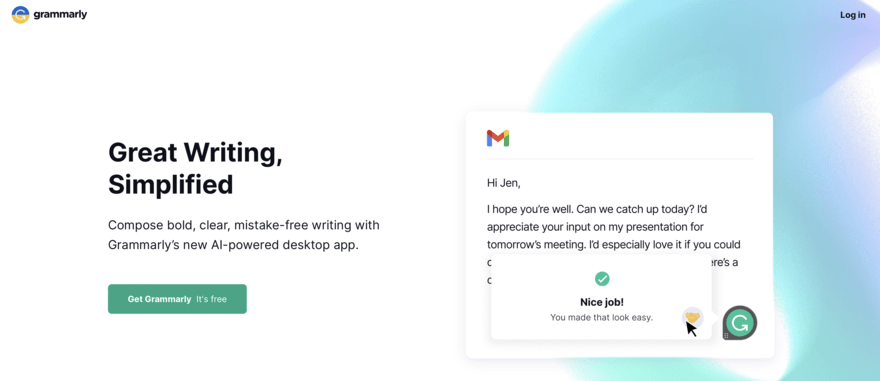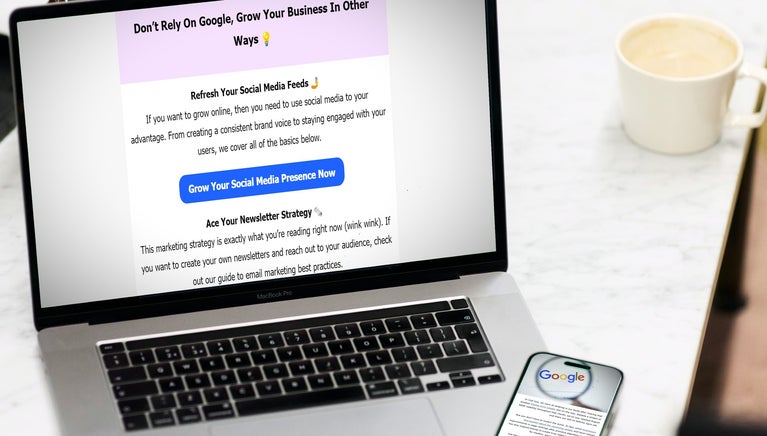15 Common Blogging Mistakes To Avoid
If you click to purchase a product or service based on our independent recommendations and impartial reviews, we may receive a commission. Learn more
Whether you’re new to blogging, or you’ve been writing posts for ages, getting to grips with your blog and avoiding common blogging mistakes can be tricky.
Blogging is a simple way to achieve online success, but that doesn’t mean it’s easy. In fact, it’s far from it.
If you feel like your blog posts aren’t achieving the results you were hoping for, or you’re keen to avoid common pitfalls as you start out on your blogging journey, then we’ve got you covered.
Our team of experts have put together 15 common blogging mistakes – and how you can avoid them – in order to give your blog the best possible chance of success.
15 Common Blogging Mistakes To Avoid
Anyone can start a blog! With a little time, practice, and knowledge, you can use your blog posts to boost your online presence and deliver results for your online business.
So, what are the key blogging mistakes to avoid?
#1. Not Understanding Your Audience
Once you know how to start a blog, the next step is to understand your audience. There’s no point wasting time and brain power writing blog posts if your audience isn’t interested in reading them.
All too often people write blog posts about topics that their audience doesn’t want to read about.
It’s not just post topics to consider either. In order to ensure your blog is successfully targeting your audience, you need to fully understand how they behave online.
How much time do they spend reading blogs? Are they more likely to read long-form content or shorter articles? Do they have a preferred blog post format such as listicles or Q&As?
How To Avoid It
Undertake audience research before you begin planning and writing your blog posts. This will allow you to get under the skin of your readers, and ensure your content is accurately meeting their desires.#2. Writing About Too Many Topics
One of the most common blogging mistakes is writing about too many topics.
It can be tempting to write about anything and everything on your blog, and the thought of limiting yourself to just one topic can seem daunting.
The truth is, that just like when building any online business, finding a niche for your blog is crucial.
Without a clear niche, readers won’t know what to expect from your blog. Your audience is going to get confused if your blog posts are about film photography one week and the next you’re talking about pet care.

Writing about too many topics can also cause damage to your online reputation. It’s hard to believe someone can be an expert on multiple topics, but sticking to just one key area will help position you as a thought leader in your field.
How To Avoid It
Before you begin writing your blog posts, take the time to carve out your niche so you know what to blog about. It’s important to find a gap in the market and ensure your niche matches your broader business interests. Find out how to conduct market research here.#3. Writing for Yourself, Not Your Audience
We all like to think our lives and opinions are the best. In reality, not everyone wants to hear about your favorite color, or your personal opinion on current affairs.
The most popular and successful blogs are the ones that are useful for readers. As tempting as it might be to give your posts a personal spin, sticking to the facts that your audience is looking for will be more beneficial.
Similarly, you might be interested in reading about the topics you’re writing about, but that doesn’t mean your audience is.
Every blog post you publish should always be centered around your readers.
How To Avoid It
You can still talk about personal events and experiences, you just need to find the right angle for your blog posts. For example, writing a blog post about your recent holiday to Disneyland could be useful for readers if you position it as a travel review.#4. Not Publishing Frequently Enough
If you’re going to blog then you need to keep it up.
One of the biggest blogging mistakes to avoid is to write and publish a blog post, only to leave it a month before you publish another one.
If you’re publishing blogs sporadically, or going through bursts of content creation only to follow up with an extended spell of nothing, your blog isn’t going to achieve the results you want.
The more content you publish on your blog the more chance you have of keeping readers engaged and interested.
Regularly publishing new content is also a great way to help search engines find and rank your blog posts, ultimately driving more traffic to your blog.
How To Avoid It
Create an editorial content calendar that plans out your blog posts months in advance. You can use this to see what content still needs to be written and allows you to get all of your post ideas in one place. We recommend aiming to publish at least one blog post a week.#5. Poorly Formatted Posts
Your blog post could be the best written and most informative piece of content online, but if it’s poorly formatted you don’t stand a chance of achieving blogging success.
Nobody wants to read blog posts that aren’t displayed in a user-friendly way on the screen.
It’s all too easy to concentrate on the content of your blog post and forget about formatting the post in a way that’s easy to read.
How To Avoid It
Use sub-headings and page breaks to break up large chunks of text and include images to add an engaging element. Bullet points and information boxes are also great ways of making sections of your text stand out.#6. Forgetting To Optimize for SEO
Blog posts are a mainstay of SEO (Search Engine Optimization) and for good reason.
They provide a great opportunity to add keywords and position yourself as an expert in your field.
A common mistake that people make when writing blog posts is forgetting to properly optimize their content for search engines like Google. Not doing so can cost you a major amount of potential traffic.
The better you optimize your posts for search engines, the more chance you have of appearing high in the search results for your target keywords.
How To Avoid It
In order to ensure you don’t forget to optimize your blog posts for SEO, here are some quick tips:
- Do keyword research
- Understand the intent behind your target search terms
- Include internal and external links within your blog post
- Make use of subheadings, meta descriptions, and alt tags, all featuring your target keywords
#7. Not Linking to Other Content
Once a reader has landed on your blog and finished reading their chosen post, what do you want them to do next? Read some more of your content, of course!
The best way to encourage readers to stick around on your website, and explore more of your blog, is to include links to other content within each post you write.
Often, once a reader has completed reading a blog post, they’ll want to go on to conduct further reading on that topic, so you need to be sure to direct them to your content.
Not including links to other content in your blog posts will simply lead to readers leaving your website and finding the blog posts they’re looking for elsewhere.
How To Avoid It
Create a linking strategy as part of your editorial calendar. Decide which other articles you want to link to before you begin writing your blog posts. This will help to ensure your links are placed naturally within your content and that you’re linking to the most beneficial blog posts.#8. No CTA
A key feature of any blog post should be the call to action (CTA) at the end. Readers need to know what you want them to do next.
A CTA can be anything from directing readers to another article to read, asking them to follow you on other platforms, or encouraging them to leave a comment with their feedback on the article.
All too often, blog posts won’t clearly lay out the next action for users to take which can lead to them leaving the website and dropping out of your ecosystem.
How To Avoid It
Reading your blog post should not be the end of a user’s journey. Ensure each article features a CTA at the end. You can add these to your editorial calendar to help you remember.#9. Using Uninspiring Titles
The title or headline for your blog post is there to tell readers what your blog post is about and encourage them to read it.
Sadly, it’s common for titles to be an afterthought, resulting in uninspiring headlines that don’t grab the attention of potential readers.
If your title doesn’t engage your readers then you’re going to have a hard time convincing them to read your blog post.
How To Avoid It
While there’s no clear-cut formula for creating the perfect blog post title, we recommend you:
- Include your target SEO keyword(s)
- Ensure the title is accurate
- Use adjectives and terminology to make it sound exciting
- Lead with the most important part of your article
- Avoid inaccurate clickbait
#10. Forgetting To Update Your Content
When writing blog posts, it’s important to remember that not everyone is going to read your posts right away.
In fact, people might land on your articles in months or even years to come! Therefore, it’s crucial you keep them up to date as time passes.
A common blogging mistake is forgetting to go back and update older content with the latest facts and figures.
Regularly updating your old content is also a great way of keeping your website high up in the rankings of search engines. Search engine bots such as Google are always looking to rank the most up-to-date and relevant content.
How To Avoid It
The fact is, you simply need to remember to update your old content and we can’t do that for you. What we can do is suggest setting a reminder for a few times throughout the year to go back through your blog posts and establish if any need updating.#11. Plagiarism
If you’ve identified some competitors’ blogs during your research stage then you can use these to help inspire ideas for your own blog.
What you can’t do is simply copy and paste their content.
Using existing content for inspiration is fine. In fact, it’s a classic blogging technique, but a common mistake is not changing it enough, or not adding your own spin on the content before you upload it.
Plagiarism is serious business, and you could even end up getting sued if you’re found to be copying someone else’s work.
How To Avoid It
If you’re worried that your content is too similar to existing articles on the internet, you can upload your content into plagiarism checkers such as Grammarly to ensure it’s safe to upload.#12. Not Promoting Your Blog Posts
It’s all very well writing amazing blog posts, but how can you expect people to read them if you don’t promote them?
Often, people will put a load of time and effort into writing the very best blog posts, only to not bother promoting them once they’ve been published.
Promoting your blog posts on social media platforms and email marketing is a great way to drive traffic to your website and help raise brand awareness.
Not promoting your blog posts to your target audience makes all the time and effort you’ve put into building your blog practically pointless.
How To Avoid It
Create a promotion calendar to run alongside your editorial calendar. Each time you publish a blog make sure you set a reminder to promote it across all of your social media channels. Get more tips on how to promote your website here.#13. Not Proofreading Your Content for Mistakes
With so many blogs online you need to find ways for yours to stand out from the crowd. One of those ways is to ensure your writing is of the highest quality possible.
People often think that once they’ve finished writing their blog post they’re done. But they’re wrong.

It’s crucial that you take the time to proofread your blog posts to spot any mistakes before you hit publish.
A blog post that’s littered with spelling mistakes and grammatical errors suggests to the reader that the blog is unprofessional which can damage your online reputation.
How To Avoid It
Always proofread your blog post before you upload it. If you’re concerned about missing any errors invest in a spell check tool such as Grammarly or Reverso. They’ll flag up any errors and advise you on how to correct them.#14. Ignoring Comments From Readers
One of the most beneficial parts of your blog is the comments section, and yet this is often neglected by bloggers.
Taking the time to respond to comments on your blog can have multiple benefits, including:
- Building relationships with your audience
- Encouraging people to comment on other blog posts
- Giving you an insight into the content that people want and enjoy
Ignoring comments from readers, or simply forgetting to check, can lead to your audience deciding not to comment in the future or, even worse, finding another blog to read instead.
How To Avoid It
Dedicate the task of replying to comments to an individual at a specific time. If you have more than one person running your blog, delegate the task to someone who can set aside time for replying to comments. If it’s just you, then block out an hour of your calendar each week for replying.#15. Not Repurposing Existing Content
A common blogging mistake is related to content ideas. A lot of people think they always need to be coming up with brand new ideas for blog content.
Instead, you can take a look at your existing content, such as videos, email marketing, and social media posts, and repurpose the high-performing ones into blog posts.
Similarly, you can take your best blog posts and convert them into various different content types. Think podcasts, videos, social media posts, and infographics.
Repurposing existing content is a real time-saver, and it’s a great way to ensure you’re getting the most out of your best content.
How To Avoid It
If you’ve got a blog post that’s receiving a lot of traffic then the chances are that users are looking for information on the topic on other platforms too. Repurposing your article into video content for YouTube, or breaking it down into key facts for social media posts are great ways of capturing those searchers.Common Blogging Mistakes: Summary
Using a blog to drive traffic to your website and boost your online business can be super successful.
While it’s a popular growth method, people are still guilty of committing various common blogging mistakes which can impact their blog results.
But, if you can avoid these pitfalls with the help of the tips in this article, then you can utilize a blog to drive traffic to your website, build relationships with your audience, and raise brand awareness.
And, as we mentioned earlier, every blog post should have a call to action and ours are no different, so make sure you let us know in the comments which of these tips you’ll be implementing in your own blogging strategy!
We have another article dedicated to bringing you blogging tips, so be sure to give it a read next.
Frequently Asked Questions
Starting a blog can have a number of benefits. They are a great way of driving traffic to your website and building relationships with your target audience. If you want to position yourself as a leading industry expert then a blog is a great way to do so.
A good blog post should be useful to the reader. It should provide them with the information they are looking for in an easy-to-digest and engaging way. A catchy and attention-grabbing title is also important, as well as ensuring you have formatted your blog in a way that makes it easy to read.
Deciding what to blog about can be hard. Try to avoid writing about too many topics and instead focus on a niche. If you’re building a blog as part of an existing online business then your posts need to be relevant to your brand and services. If you’re creating a standalone blog then make sure to choose a niche that you’re interested in and have a good level of knowledge about.

6 comments